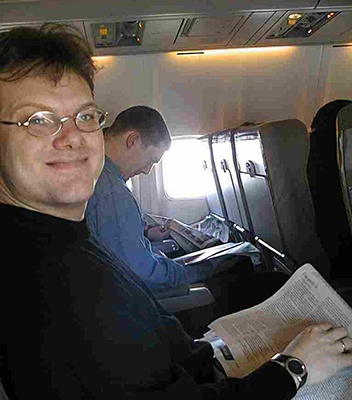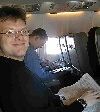An Afternoon at Tanglewood
By: Michael Miller - Aug 11, 2006
Boston Symphony Orchestra at Tanglewood: Mozart, Strauss and Beethovern
August 6, 2006 2:30 PM
Donald Runnicles, conductor, Lars Vogt, piano
Mozart, Symphony No. 38 in D, K.504, Prague, Richard Strauss, Suite from Der Rosenkavalier, Beethoven, Piano Concerto No. 5 in E flat, Op. 73, "The Emperor"
Sunday was a beautiful afternoon at Tanglewood—temperate weather, a clear sky spotted with only decorative clouds, which occasionally passed over the sun to provide a little unnecessary shade for the crowded but relaxed picnickers on the lawn. The shed was close to full with an equally relaxed audience who seemed happy enough with the musical event, which in fact offered little enough distraction from the pleasant weather, as long as they didn't listen too closely.
The orchestra played neatly, which they almost always do nowadays. David Runnicles led them in an unexceptionable reading of the Prague symphony with the accents nicely placed and a pleasing forward sweep towards a brisk final movement. There were no striking insights here either. Also lacking was the lively and sensitive interplay of the the instruments which was so apparent under Maestro Levine's direction during the recent Mozart anniversary weekend, which gave one the impression that the BSO had arrived at a natural and confident style of Mozart playing of their own.
The next piece on the program was something of a dinosaur, a concert suite extracted from Richard Strauss "Rosenkavalier," evidently for a 1944 New York Philharmonic concert (under Rodzinski, who especially loved the opera) by an arranger, who made little attempt to preserve the drama or mood of the opera, achieving nothing more than an audience-rousing program filler. Today, now that opera performances are more accessible both on stage and on audio and video discs, the suite is nothing more than a relic of the days when "opera for people who hate opera" was considered an effective form of outreach. There is nothing of Stokowski's intelligence in crafting his "symphonic syntheses" after Wagner, which have justly attracted renewed interest in recent years. Not that the music isn't enjoyable. I wish I could say I enjoyed it more than I did, but Mr. Runnicles, whose able work I've admired in the past, seemed bent on spelling out every phrase and every passage to the orchestra and to the audience. Phrasing and tempo changes seemed exaggerated. Slow tempi dragged, and fast tempi fairly jumped down one's throat. The subtle transitions, already largely amputated by the arranger, at which Strauss so characteristically excelled, were pretty much done for. The raucous conclusion elicited loud applause.
After the break the young German pianist Lars Vogt gave a supremely polished and intelligent performance of Beethoven's Emperor concerto, one of an intimate and nuanced sort, and one which deserved a much better accompaniment than that provided by Mr. Runnicles and the BSO. It is true that the orchestral parts of the "Emperor" are more symphonic than in Beethoven's preceding four, but that doesn't mean that he forgot how to score a concerto. For all its grandeur and militaresque parody, the "Emperor" only extends the chamber music-like interplay between the solo instrument and various instruments and combinations of instruments in the orchestra in new directions, for example the revolutionary passage in which the pianist plays against the tympani in the coda of the third movement—actually one of the more successful moments in this performance. Unfortunately too much of it passed with limited—mostly loud—dynamics and excessively aggressive trumpets and drums. Orchestra and soloist may as well have been playing two different pieces.


